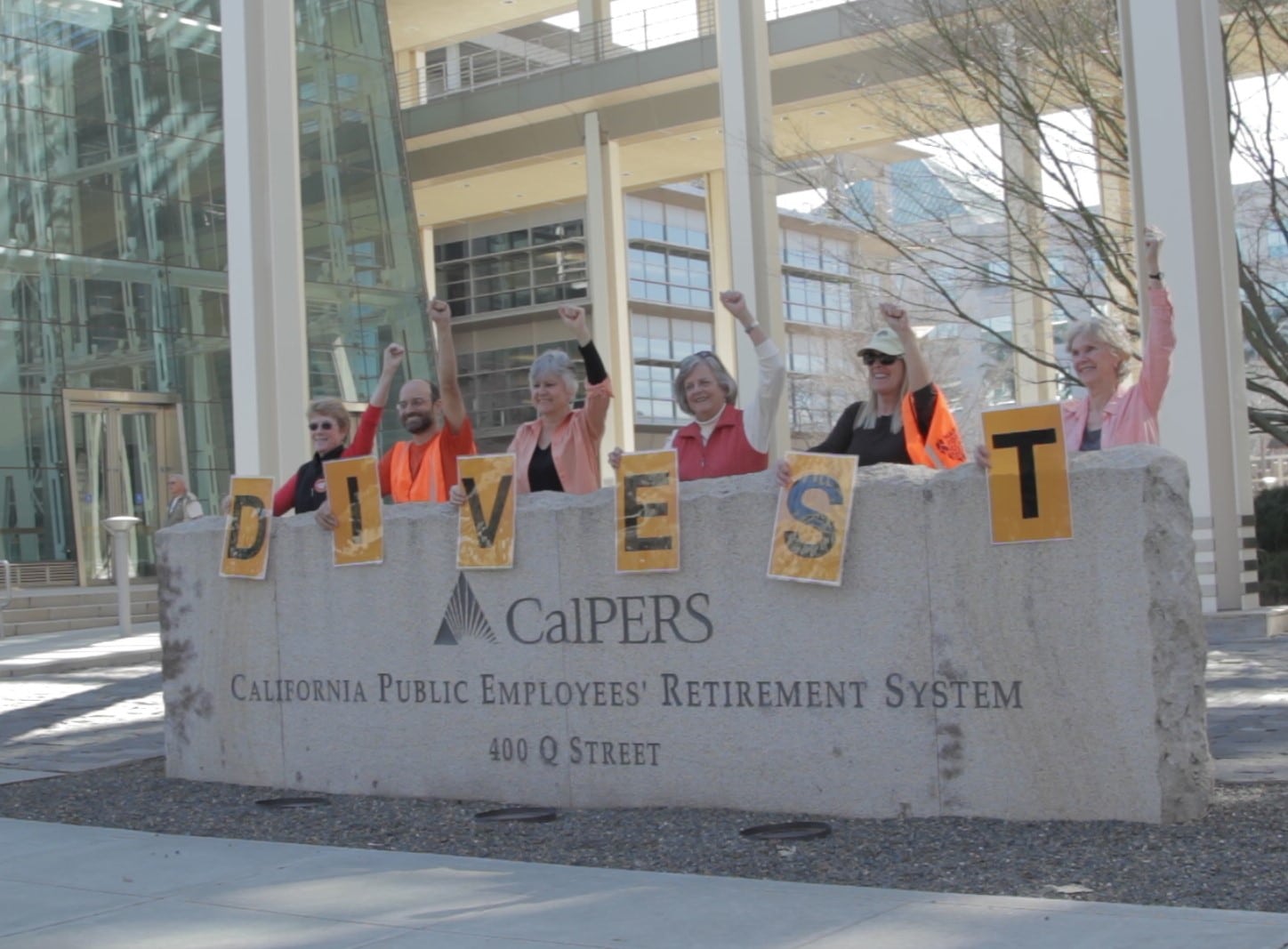Does engaging with oil and gas giants by remaining invested in them – keeping a “seat at the table” – help in the fight against climate change?
A new report suggests not very much – at least judging by the record of the California Public Employees’ Retirement System (CalPERS).
The report by environmental group Fossil Free California takes the public pension fund to task for its results to date, highlighting its history of pushing “the importance of corporate engagement on climate change” in public statements, while simultaneously voting against climate measures in shareholder meetings.
The report details dozens of votes against climate measures by CalPERS this year — including votes against greenhouse gas reduction targets at Royal Dutch Shell, against reporting and reducing greenhouse gas emissions at BP, and against pushing big banks to get in line with international “net zero by 2050” strategies.
In fact, CalPERS has voted against every climate resolution at major American and Canadian banks so far this year, the report claims.
The report also casts doubt on one of the biggest accomplishments of CalPERS’ engagement strategy – the election of several new members to ExxonMobil’s board of directors last year, nominated by the activist investment firm Engine No. 1. The report faults Engine No. 1’s directors for voting against two recent proposals to set greenhouse gas targets that would account for the pollution caused by the fossil fuels ExxonMobil sells, and to produce a report on low-carbon business plans.
“Despite their best efforts, CalPERS and [California’s other major pension fund] CalSTRS have failed to persuade fossil fuel companies to reduce their greenhouse gas emissions, increase their renewable energy production, or transition from fossil fuels to renewable energy,” the report concludes. “By opposing climate proposals at the very companies they claim to influence, the funds’ shareholder activism is not only ineffective – it’s undermining climate action.”
California lawmakers are currently considering a bill that would spur these pension funds, which invest retirement funds for state employees – including many, like the state’s firefighters, who are today on the front lines of the climate crisis – to drop their investments in fossil fuel producers.
The fund has an estimated $7.4 billion worth of fossil fuel investments that the bill would require them to shed. In April, its board voted to oppose that law, arguing that it would lose its “seat at the table,” only to be replaced by investors that “may not have the same interest in long-term sustainability as CalPERS”..
CalPERS declined comment on Fossil Free California’s new report.
Engine No. 1 Stalls Out?
In late May, investors at ExxonMobil voted for the first time on a climate proposal designed to push the company to adopt Paris Agreement-aligned climate plans, advanced by the Dutch climate campaigners Follow This. Exxon, the campaigners said, is the last oil giant that still tries to ignore the climate-altering effects of burning the fossil fuels it sells – its so-called Scope 3 emissions – when it sets its climate goals.
“With their votes, shareholders in ExxonMobil will show what future they prefer,” Follow This told shareholders gathered at Exxon’s Annual General Meeting, “a world of increasing oil and gas production and devastating climate change or a world that curbs emissions in order to achieve the goal of the Paris Climate Agreement.”
The vote failed, despite attracting the support of what Follow This called “a small but significant minority” of about a third of ExxonMobil’s investors.
Engine No. 1 – a hedge fund that last year, with the backing of CalPERS, secured three positions on Exxon’s board for its slate of “climate-friendly” candidates – was among those that refused to support it.
The hedge fund also came out against a proposal to force the oil giant to report on its plans for a low-carbon business strategy, it recently disclosed on its website.
Engine No. 1 did, however, throw its support behind a vote requiring the company to produce a report on reaching “net zero” by 2050 and another on reducing plastic pollution. Just before the vote, Engine No. 1 also put out a statement touting ExxonMobil’s moves to cut Scope 1 and 2 emissions – but lacking any mention of Scope 3, the category that covers about 90 percent of Exxon’s carbon footprint.
ExxonMobil management had cited the war in Ukraine as a reason to hold off on the Follow This proposal, with the latter responding that “both crises can and should be dealt with simultaneously by shifting investments to renewables, especially the current windfall profits.”
“So much for Engine No. 1’s climate activism at ExxonMobil,” blared the March headline for an op-ed by Bernard S. Sharfman, of George Mason University’s Antonin Scalia Law School. Sharfman praised the fund’s founder, who had just penned a column supporting more fracking, writing, “As I’ve argued in the Harvard Business Law Review, Engine No. 1’s activism at Exxon wasn’t really about mitigating climate change. It was a clever way to generate investor interest in the launch of two Engine No. 1-sponsored ETFs.”
Former Engine No. 1 officials had warned that change would necessarily be slow. “I think we were pretty clear in the campaign that any transformation is going to take a long time,” Charlie Penner, who served as the hedge fund’s head of active engagement but left Engine No. 1 late last year, told Inside Climate News shortly before Exxon’s annual meeting this year.
The most recent United Nations Intergovernmental Panel on Climate Change reports show that the impacts of global heating are moving much faster than many had expected just 10 years ago, and further delay will put a liveable future out of reach.
Pattern of Voting Against Climate Action
ExxonMobil is hardly the only fossil fuel giant that CalPERS remains invested in.
This year, CalPERS voted against shareholder proposals at BP, Equinor, Occidental, Royal Dutch Shell and Woodside Petroleum, Fossil Free California found.
The measures included efforts to prod fossil fuel firms to reduce their greenhouse gas emissions, approve energy transition strategies, create a fund for oil workers, stop exploring for more undiscovered oil and gas deposits, and to produce reports on greenhouse emissions.
Its voting record at major banks showed the pension fund opposed calls to bring banks into line with international “net zero by 2050” targets, to stop funding fossil fuel expansions, and to take the Paris Agreement seriously.
CalPERS’ failure to support those measures, Fossil Free California argues, will have impacts not just on how much money pensioners will have available when they retire — but also the world they retire into.

‘Climate Risk’ Successes
CalPERS has previously cited agreements by BP and Royal Dutch Shell in 2015 on climate risk reporting as examples of the benefits of “keeping our ‘seat at the table.’” The fund also pointed to climate risk reporting successes at mining giants Rio Tinto, Anglo American, and Glencore and the 2017 appointment of atmospheric scientist Susan Avery to ExxonMobil’s board of directors. “Investor engagement was an essential part of the successful campaigns,” CalPERS wrote in a March 2017 fact sheet.
CalPERS has been one of the driving forces behind the Climate Action 100+ campaign, which promotes investor engagement on climate – but some have questioned their success rates there, too. “No company has fully aligned their capital expenditure with a 1.5C future or produced financial statements that reflect climate risks,” Catherine Howarth, CEO of ShareAction, wrote in a May op-ed in Reuters. “And every single oil and gas company in focus is planning projects that are inconsistent with the goals of the Paris Climate Agreement.”
CalPERS has also cited its fiduciary duties, which require the fund to act in its members’ best interests, in opposing divestment. “These duties include an explicit obligation to diversify the portfolio to minimize the risk of loss and maximize the rate of return,” CalPERS wrote in a fact sheet.
It’s not clear that there’s a consensus in the financial world on how those with fiduciary duties should approach climate change and fossil fuel companies, just based on the industry’s financial prospects. The University of California Retirement System, for example, recently sent its members a letter informing them that it had “determined that the long-term prospects of companies that own fossil fuel reserves no longer meet the financial criteria for inclusion” in their portfolio.
Divestment’s supporters have criticized the concept of engagement, noting for example that shareholder votes are often not binding on company management, making them unreliable.
“Engagement is likely to assist Big Oil and Big Coal in postponing the day when governments limit the burning of fossil fuels,” retired attorney and former Security and Exchange Commissioner Bevis Longstreth, who had supported the successful fossil fuel divestment campaign at Harvard University, wrote in 2014. “Engagement with institutional investors like Harvard gives the fossil fuel giants the protective cover they need to stretch out the transition process to renewables for as long as they can.”
“It legitimizes talk over action,” Longstreth wrote.
Top climate experts are urging investors and governments alike to start making different choices.
“The energy crisis exacerbated by the war in Ukraine has seen a perilous doubling down on fossil fuels by the major economies. The war has reinforced an abject lesson: our energy mix is broken,” United Nations chief António Guterres said at a summit in Austria on Tuesday. “Had we invested massively in renewable energy in the past, we would not be so dramatically at the mercy of the instability of fossil fuel markets.”
Subscribe to our newsletter
Stay up to date with DeSmog news and alerts







